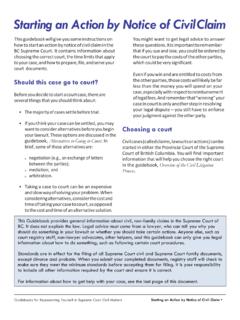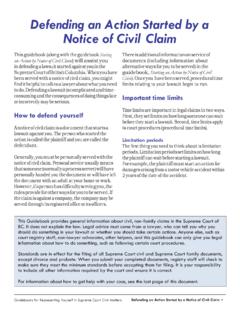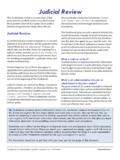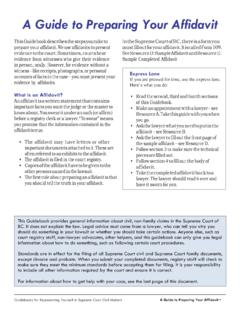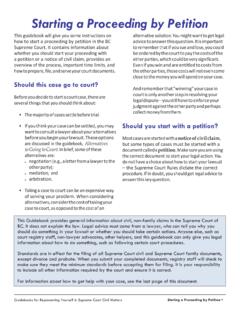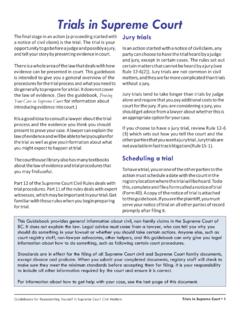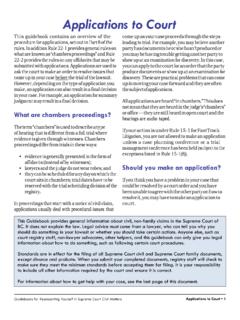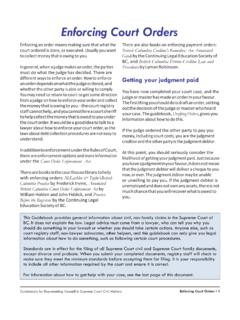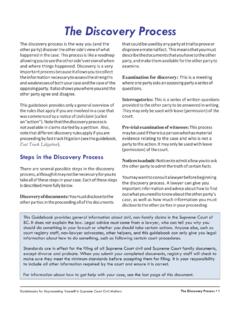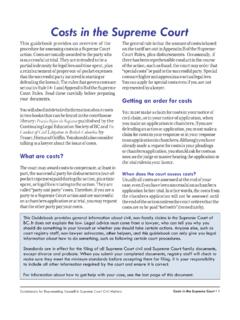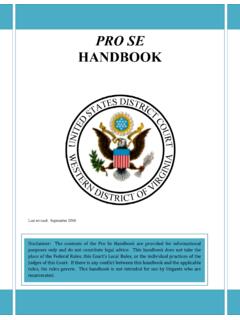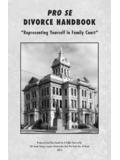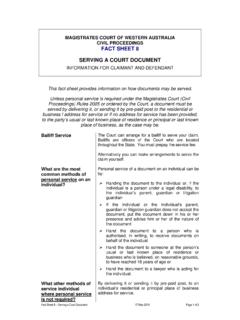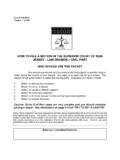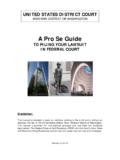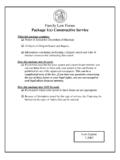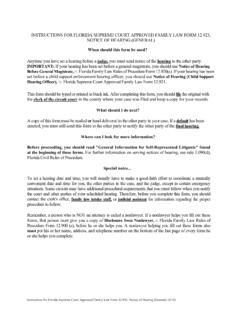Transcription of Resolving Your Case Before Trial - supremecourtbc.ca
1 Resolving Your case Before Trial Guidebooks for representing yourself in Supreme Court civil Matters Resolving Your case Before Trial This booklet explains how you can resolve your case Before it goes to Trial . Only a small percentage of cases go to Trial , as most disputes are resolved Before reaching that stage. The ways that can happen are discussed in this guidebook. It is important to think about settling your case ; lawsuits are time-consuming and expensive and your costs increase at every stage of the proceeding. The most common way to resolve your claim is to negotiate a settlement with the other party or parties.
2 Using a mediator to help settle your claim is also an excellent and efficient way to resolve a dispute. See the guidebook, Alternatives to Going to Court. Stopping your claim against one or all defendants is called discontinuance and you may decide to do that at some point in your lawsuit if it appears that you have very little chance of succeeding in your action or little hope of collecting judgment against the defendant. Similarly, the defendant can end the lawsuit by withdrawing his or her response to the claim. This might happen if the defendant knows that the defence cannot be proved at Trial , and makes a decision to save costs by withdrawing the response.
3 Striking pleadings is an option to have the court partially or completely disallow a notice of civil claim, response or other pleading if the pleading is scandalous, frivolous or vexatious (see Rule 9-5). Default judgment may be taken against the defendant where the defendant fails to file a response to the notice of civil claim, does not comply with the rules, or withdraws a response to a civil claim. Summary judgment is another way to resolve a lawsuit Before Trial . Such an application is brought where the plaintiff can prove that there is no reasonable defence to the claim, or the defendant can prove that the plaintiff has no reasonable claim against him or her.
4 Summary trials are based on written evidence ( , affidavits, interrogatories, expert reports, and written argument) rather than hearing the evidence of witnesses in court. You can have your case heard by a judge much sooner than a regular Trial , but summary trials are complicated in other ways. It is always a good idea to talk to a lawyer about the best way to resolve your case Before Trial . Settlement If your dispute reaches the stage where an action has been commenced in the Supreme Court, you can still reach an agreement to resolve the dispute any time Before the completion of the Trial . A settlement ends or avoids a court proceeding.
5 Cases are sometimes even settled after Trial if a notice of appeal is filed. This Guidebook provides general information about civil , non-family claims in the Supreme Court of BC. It does not explain the law. Legal advice must come from a lawyer, who can tell you why you should do something in your lawsuit or whether you should take certain actions. Anyone else, such as court registry staff, non-lawyer advocates, other helpers, and this guidebook can only give you legal information about how to do something, such as following certain court procedures. Standards are in effect for the filing of all Supreme Court civil and Supreme Court family documents, except divorce and probate.
6 When you submit your completed documents, registry staff will check to make sure they meet the minimum standards Before accepting them for filing. It is your responsibility to include all other information required by the court and ensure it is correct. For information about how to get help with your case , see the last page of this document. Resolving Your case Before Trial Guidebooks for representing yourself in Supreme Court civil Matters Why it s important to think about settling Lawsuits are very expensive and your costs increase at each stage. If you are involved in a lawsuit, get as much information as possible early on in the process so you can think about settling your claim at the earliest opportunity.
7 When considering settlement, you need to think about the money you have already spent and the money you will spend if you take your case to Trial . Think also about the possibility that you may lose the lawsuit and be ordered to pay the other party s costs. Making an offer to settle does not mean that you are admitting liability in the lawsuit. It simply means that you would like to resolve the lawsuit Before it goes to Trial . Under the rules, the party who is unsuccessful in a lawsuit is generally ordered to pay the other party s costs. The costs of the other party are calculated in accordance with the rules (see Rule 14-1 and Appendix B of the Rules of Court).
8 Although costs only cover a portion of the total expenses that someone must pay to take a case to court or defend a case , they can still be very significant. For more information about costs, see the guidebook, Costs in the Supreme Court. In addition to the expense and the risk that you will be ordered to pay costs, you also need to think about the amount of time you will have to spend in: locating, listing and examining documents; preparing for and attending examinations for discovery; obtaining experts; and preparing for Trial and attending the Trial . Consider also the emotional toll of taking your case to Trial .
9 You will be doing all this work in addition to your regular daily routine. It may take much longer than you expect and there is no guarantee that you will win. Getting advice from a lawyer about your case can help you figure out what would be a reasonable settlement of your claim. A lawyer may also be able to help you negotiate a settlement. If you can reach an agreement to settle the case , make sure that your settlement is documented so that it ends the dispute. A lawyer can give you advice on how to properly document a settlement so that the settlement agreement cannot be later questioned and reopened.
10 If you are unable to negotiate a settlement directly with the other side, a mediator may be able to assist you and the other party (or parties) to reach an agreement. See the guidebook, Alternatives to Going to Court for more information on mediation. What documents do you need to settle a case ? Most of the documents that the parties prepare to settle a case are just exchanged between the parties and are not filed with the court. These may include: a letter to the other party setting out the terms of the settlement; an acknowledgement that the other party accepts the terms of the settlement; a release (this is a legal document which the parties sign to acknowledge that he or she is giving up all claims in connection with the matters giving rise to the dispute as part of the terms of the settlement); and any other documents required to complete the settlement and which might include: o share transfers; o property transfers; and o cheques.
